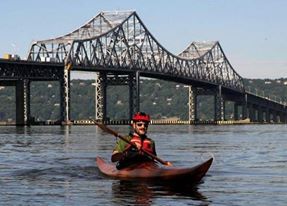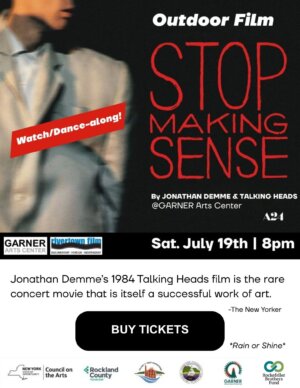by Bill Batson
Our collective carbon footprint is crushing the delicate eco-system that sustains our planet. At 6:30p on April 16 in The Nyack Center, Pace Law School Professor Karl S. Coplan will offer practical advice on how to reduce your personal carbon footprint, including insights on what you eat, how you commute, run your house, and travel.
The director of the Pace Environmental Litigation Clinic and principal outside counsel for Riverkeeper, will publish his new book, Live Sustainably Now: A Low-Carbon Vision of the Good Life, in November. The book chronicles Coplan’s experience sticking to a carbon budget, including commuting to work by bike and kayak, or electric motorcycle and family trips to the mountains in a hybrid car and to New York Harbor in a sailboat.
“Addressing climate change will require people in the developed world to live with a smaller carbon footprint,” says Coplan. “We need to redefine the Western ideal of the “good life” to substitute a vision with less energy consumption. That will only happen when culture changes–i.e., substantial numbers of people start living a good life without emitting tons and tons of greenhouse gases.”

“I think that an individual direct footprint of four tons per year is defensible as sustainable for a middle class citizen of a developed nation during the phaseout of all fossil fuels over the next few decades.” — Karl S. Coplan
After graduating from Columbia Law School in 1984, Coplan clerked for The Honorable Warren E. Burger, chief justice of the United States Supreme Court. Professor Coplan and the Pace Environmental Litigation Clinic have brought numerous lawsuits enforcing the Clean Water Act and other environmental laws. These cases include Catskill Mountains Chapter, Trout Unlimited v. City of New York, in which the Second Circuit Court of Appeals held that the transfer of polluted, silt-laden water from one watershed to another required a permit pursuant to the federal Clean Water Act. Professor Coplan has also participated in litigation and Clean Water Act permitting proceedings involving several Hudson River power plants, including the proposed Bowline 3 power plant, and the Lovett, Roseton, Danskammer, and Athens plants.

“A couple of times a week from April through October I paddle my kayak across the Hudson River, and leave it at a friendly boat club, where I pick up my bike and ride from Tarrytown to work. I do that for exercise and for fun, with the side benefit of emitting zero carbon and zero fossil fuel—but it takes a long time too. [When the Shared Use Path across the MCB / TZB] opens, I can bike to work then.” — Karl S. Coplan
 Coplan’s Nyack Center talk on April 16 at 6:30p will be followed by a meet-and-greet reception. This Knowledge Market event is sponsored by the Lamont Doherty Earth Observatory, Nyack News And Views, The Nyack Center and La Talaye Catering & Event Design. To purchase tickets, visit Nyackknows.com. The Nyack Center is located at the corner of S Broadway and Depew in Nyack, NY.
Coplan’s Nyack Center talk on April 16 at 6:30p will be followed by a meet-and-greet reception. This Knowledge Market event is sponsored by the Lamont Doherty Earth Observatory, Nyack News And Views, The Nyack Center and La Talaye Catering & Event Design. To purchase tickets, visit Nyackknows.com. The Nyack Center is located at the corner of S Broadway and Depew in Nyack, NY.
The Knowledge Market is a continuing education forum that creates a neighbor-to-neighbor information exchange. Future evenings will engage members of our community who are impacting the worlds of science, law, civil society, and culture.
See also:
- Earth Matters: Carbon Offsets 101, by Karl Coplan. 1/30/2019
- LIVE! SUSTAINABLY! NOW! Karl Coplan’s blog about living a good life with a sustainable individual carbon footprint of about four tons CO2 equivalent per year.
- Earth Matters: Youth Climate Strike Nyack, 3/19/2019
- Earth Matters: Polar Ice (And Why You Care), 4/11/2018








